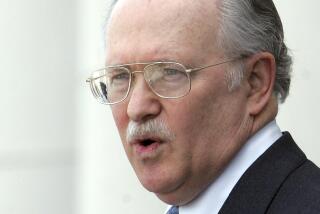British Judges OK Surgery to Separate Twins
- Share via
LONDON — Declaring themselves “a court of law, not a court of morals,” three judges from Britain’s Court of Appeal ruled unanimously Friday that doctors may operate to separate conjoined twins even though surgery will lead to the death of one of the girls.
The judges determined that the healthy twin’s right to life outweighed that of the weak sister, who depends on her sibling for survival. The judges upheld a lower court decision to permit the separation against the wishes of the girls’ devout Roman Catholic parents.
But the court also gave the parents permission to appeal the first case of its kind to the House of Lords, Britain’s highest court. Lawyers for the couple and the weaker twin said they will study the 130-page ruling and make a decision within days.
Doctors said they will not proceed with the operation before the case makes its way through the courts.
Lord Justice Alan Ward, himself the father of twin girls, said the three judges agonized over the decision and drew on historical scholarship, from Aristotle to Hobbes, Locke and the 18th century jurist William Blackstone, a founding father of English and American legal education.
“I freely confess to having found it truly difficult to decide--difficult because of the scale of the tragedy for the parents and the twins, difficult for the seemingly irreconcilable conflicts of moral and ethical values, and difficult because the search for settled legal principle has been especially arduous and conducted under real pressure of time,” Ward said in reading the court’s decision.
The children, who have been given the false names of “Jodie” and “Mary” to protect their identities, were born at a British hospital in Manchester on Aug. 8. They are joined at the abdomen with a set of legs protruding from each side. Only Jodie has a functioning heart and lungs, and Mary depends on her for oxygenated blood. Mary has also suffered brain damage and is unable to eat on her own.
The strain of sustaining two bodies is weakening Jodie, and both girls are expected to die within six months if they remain as one. If they are separated, Mary will die. Doctors say that after extensive surgery Jodie could have a fairly normal life, though with disabilities.
The parents, natives of Malta, have said they cannot sacrifice one daughter for the other and asked that the girls be left in their current state. The parents are supported by the Roman Catholic archbishop of Westminster, Cormac Murphy-O’Connor.
But the judges said it was the court’s duty to look after the children’s rights, not those of the parents. The fact that the rights of the two children were in conflict made the case so difficult.
Ward, writing the lead opinion, rejected the idea that Mary was not a person in her own right. He also rejected the lower court’s argument that surgery would not be an active intervention bringing about Mary’s death but would rather be a removal of her life-support system.
Mary is an individual, Ward wrote, but “the sad fact is that she lives on borrowed time, all of it borrowed from her sister. She is incapable of independent existence. She is designated for death.”
He said that surgery was an “act of invasion” of Mary’s body that would bring her no possible benefit. Therefore, he said, it was the court’s job to decide whether it could put Jodie’s interests ahead of Mary’s.
Ward said it was legitimate to consider the twins’ condition and that Mary was beyond help, while Jodie could be saved from the sister who “sucks the lifeblood” from her.
“The scales come down heavily in Jodie’s favor,” Ward wrote. “Jodie has a right to protest that Mary is killing her,” he added, describing the killing of Mary as “legitimate self-defense.”
Under the circumstances, he concluded that the court should permit doctors “to choose the lesser of the two evils--the death of one twin instead of the death of both.”
Lord Justices Robert Walker and Henry Brooke concurred.
“Mary’s death would not be the purpose of the operation, although it would be its inevitable consequence,” Walker concluded. “She would die not because she was intentionally killed but because her own body cannot sustain her life. . . . The proposed operation would not be unlawful.”
The case has prompted intense national debate, and Friday’s decision drew reactions from both sides. Bruno Quintavalle of the small Pro-Life Alliance in Britain called it “infanticide” and “a green light for further attacks on human life.”
Most legal experts expect the parents to appeal to the House of Lords, but they do not believe that the couple will be successful there. The parents then could take their case to the European Court of Human Rights in Strasbourg, France, though the Court of Appeal judges said they had looked at the European convention on human rights and did not believe that their decision violated it.
Michael Freeman, a law professor at University College in London, said that any decision the judges made was going to draw criticism but that “it seems to me this is the least detrimental conclusion to which a court could come. I can’t see any other.”
More to Read
Sign up for Essential California
The most important California stories and recommendations in your inbox every morning.
You may occasionally receive promotional content from the Los Angeles Times.










